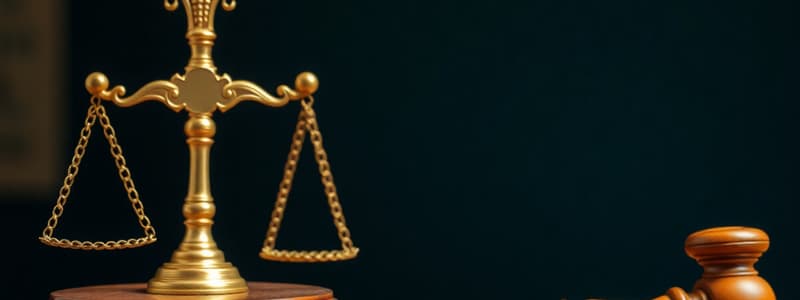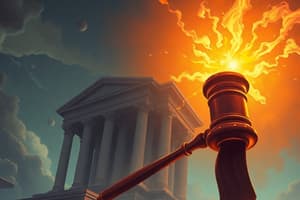Podcast
Questions and Answers
What specifically empowers the judiciary to declare laws unconstitutional?
What specifically empowers the judiciary to declare laws unconstitutional?
- The power of the Parliament
- The appointment of judges by the President
- Consultation with legislative authorities
- Judicial review (correct)
Which aspect is not a provision for the independence of the judiciary?
Which aspect is not a provision for the independence of the judiciary?
- Presidential appointment in consultation with judicial authorities
- Judges can be easily removed by the government (correct)
- High salaries that prevent financial inducements
- Judges are appointed for fixed terms
Which court can a citizen approach if their fundamental rights are violated?
Which court can a citizen approach if their fundamental rights are violated?
- District Court
- Civil Rights Court
- Family Court
- Supreme Court or High Court (correct)
What ensures that the judiciary remains unaffected by external influences?
What ensures that the judiciary remains unaffected by external influences?
What role does the judiciary play regarding fundamental rights?
What role does the judiciary play regarding fundamental rights?
What is the primary function of the judiciary in resolving disputes?
What is the primary function of the judiciary in resolving disputes?
What is meant by judicial review?
What is meant by judicial review?
Why is the independence of the judiciary crucial in a democracy?
Why is the independence of the judiciary crucial in a democracy?
What role does the judiciary play in protecting citizens' rights?
What role does the judiciary play in protecting citizens' rights?
What ensures that judges can function without external interference?
What ensures that judges can function without external interference?
What is the age at which judges of the High Court are required to retire?
What is the age at which judges of the High Court are required to retire?
Who is responsible for appointing the Chief Justice of the High Court?
Who is responsible for appointing the Chief Justice of the High Court?
What typical types of cases does the High Court try?
What typical types of cases does the High Court try?
Which authority supervises the functioning of subordinate courts?
Which authority supervises the functioning of subordinate courts?
What is the process for impeaching a High Court judge?
What is the process for impeaching a High Court judge?
What is the role of the Supreme Court in the Indian judiciary?
What is the role of the Supreme Court in the Indian judiciary?
Which of the following best describes the term 'judicial review'?
Which of the following best describes the term 'judicial review'?
What is the maximum age at which judges of the Supreme Court in India are required to retire?
What is the maximum age at which judges of the Supreme Court in India are required to retire?
Who appoints the Chief Justice of the High Court?
Who appoints the Chief Justice of the High Court?
In terms of the structure of the courts, what is the status of High Courts in India?
In terms of the structure of the courts, what is the status of High Courts in India?
What principle is crucial for ensuring the possibility of justice in the judiciary?
What principle is crucial for ensuring the possibility of justice in the judiciary?
What historical significance do the High Courts established by Queen Victoria in 1862 hold?
What historical significance do the High Courts established by Queen Victoria in 1862 hold?
Which principle is NOT a function of the judiciary in a democratic system?
Which principle is NOT a function of the judiciary in a democratic system?
Which type of jurisdiction allows a court to hear cases involving disagreements between the Centre and one or more states?
Which type of jurisdiction allows a court to hear cases involving disagreements between the Centre and one or more states?
In which type of jurisdiction does the Supreme Court have the authority to interpret constitutional issues and provide advice?
In which type of jurisdiction does the Supreme Court have the authority to interpret constitutional issues and provide advice?
What type of cases is the Supreme Court allowed to hear under its Appellate Jurisdiction?
What type of cases is the Supreme Court allowed to hear under its Appellate Jurisdiction?
Which High Court cases involve matters related to elections?
Which High Court cases involve matters related to elections?
Which of the following is NOT a feature of the Supreme Court's Original Jurisdiction?
Which of the following is NOT a feature of the Supreme Court's Original Jurisdiction?
What characterizes the process of Public Interest Litigation (PIL) as established by the Supreme Court in the 1980s?
What characterizes the process of Public Interest Litigation (PIL) as established by the Supreme Court in the 1980s?
What is the main purpose of Lok Adalats in the legal system?
What is the main purpose of Lok Adalats in the legal system?
Which of the following best describes the difference between civil cases and criminal cases?
Which of the following best describes the difference between civil cases and criminal cases?
What prompted the case filed by the People's Union for Civil Liberties (PUCL) regarding the Right to Food in 2001?
What prompted the case filed by the People's Union for Civil Liberties (PUCL) regarding the Right to Food in 2001?
In supervisory jurisdiction, which courts are primarily overseen by the Supreme Court?
In supervisory jurisdiction, which courts are primarily overseen by the Supreme Court?
Which of the following statements about criminal cases is true?
Which of the following statements about criminal cases is true?
What significant barrier often prevents individuals from accessing the court system for legal redress?
What significant barrier often prevents individuals from accessing the court system for legal redress?
What is a primary function of the High Courts in terms of judicial oversight?
What is a primary function of the High Courts in terms of judicial oversight?
Flashcards are hidden until you start studying
Study Notes
Role of the Judiciary
- The judiciary plays a crucial role in a democratic system, acting as the interpreter of laws and protector of citizens' rights.
- The judiciary ensures that individuals are not punished without due process and a proven breach of law.
Judicial Review
- The judiciary possesses the power of judicial review, making it the guardian of the Constitution.
- The judiciary interprets the Constitution and can declare any law passed by Parliament unconstitutional if it violates fundamental constitutional principles.
- This power of judicial review is essential in safeguarding the integrity of the Constitution.
Implementation of Fundamental Rights
- The judiciary upholds and guarantees fundamental rights enshrined in the Constitution.
- Citizens can approach the Supreme Court or High Court to seek redress if their fundamental rights are violated.
Independence of the Judiciary
- The Constitution emphasizes the separation of powers, preventing interference by the legislature or executive in the judiciary.
- Supreme Court and High Court judges are appointed by the President in consultation with judicial authorities, ensuring their independence.
- The removal process for judges is complex and safeguards against undue influence.
- Judges receive fixed-term appointments with high salaries to ensure their financial independence and prevent undue influence.
- The government ensures the safety of judges to protect them from threats and interference by criminals.
- Judges are prohibited from practicing law after retirement, further ensuring their independence from future cases.
Structure of Courts in India
- India operates a unified judicial system with the Supreme Court at the apex.
- The Supreme Court oversees all other courts in the country, and lower courts are bound by the decisions of higher courts.
- Both the Supreme Court and High Courts are courts of record, maintaining detailed records of past decisions.
- This system ensures consistency and fairness in the application of laws by allowing for precedent setting and citing past decisions.
Supreme Court
- Located in New Delhi.
- Headed by the Chief Justice of India, appointed by the President in consultation with other senior judges.
- Judges generally retire at the age of 65 and can be removed through impeachment for misconduct or abuse of power.
- Possesses the power of judicial review, ensuring laws passed by the legislature and executive are consistent with the Constitution.
- Exercises oversight over the operations of all Indian courts.
High Court
- The highest court within a state.
- Headed by the Chief Justice of the state, appointed by the President in consultation with the Chief Justice of India, the Governor of the state, and other judges.
- Judges generally retire at the age of 62 and can be impeached for misconduct.
- Controls and supervises lower courts within the state.
- Handles both civil and criminal cases and reviews judgments from lower courts.
Jurisdiction of Courts
- Original Jurisdiction: The right of a court to hear a case for the first time.
- Supreme Court: Disputes between states, disputes between the Centre and states, cases involving violation of the Constitution by government entities or individuals.
- High Court: Cases involving violation of Fundamental Rights, disputes concerning state elections.
- Appellate Jurisdiction: The right of a higher court to hear a case that has already been tried in a lower court.
- Supreme Court: Appeals against High Court decisions (civil and criminal cases), cases where a High Court confirms an important point of law or constitutional interpretation, cases where a High Court changes a lower court's decision and awards the death penalty.
- High Court: Criminal and civil appeals against lower court decisions.
- Advisory Jurisdiction: The power of the court to give advice on certain matters, usually constitutional issues (e.g., the Supreme Court advising the President on constitutional issues).
Supervisory Jurisdiction
- Higher courts have the power to oversee the functioning of lower courts.
- The Supreme Court has supervisory jurisdiction over all other courts, and High Courts oversees subordinate courts.
Different Branches of the Legal System
- Civil Cases: Involve conflicts between individuals or institutions (e.g., contract breaches, property disputes, inheritance disputes, divorce, guardianship). Outcomes often involve a decision favoring one party or a remedy for the aggrieved party.
- Criminal Cases: Involve offenses that harm society (e.g., theft, robbery, murder, fraud, harassment, driving offenses). Cases typically follow a process of police investigation, FIR filing, court hearings, and a verdict with potential punishments ranging from fines to the death penalty, depending on the crime.
Access to Courts
- Ideally, everyone should have access to the courts, particularly when their fundamental rights are violated.
- However, the lengthy legal process and associated costs can deter people from pursuing legal action.
Public Interest Litigation (PIL)
- Introduced by the Supreme Court in the 1980s to address the issue of access to justice for the underprivileged.
- Allows individuals or organizations to file cases on behalf of the poor or vulnerable in the High Court or Supreme Court.
- Example: The People's Union for Civil Liberties (PUCL) filed a PIL in 2001 to address the Right to Food, highlighting corruption in the public distribution system and food shortages, leading to the Court ordering the state to provide food.
Lok Adalats
- "People's courts" designed for faster dispute resolution, often resolving cases in one hearing.
- Help reduce the burden on formal courts and offer an accessible platform for the underprivileged.
- Typically presided over by a retired judge, assisted by lawyers and social workers.
- Cases are resolved through mutual understanding and agreement between the parties involved.
Studying That Suits You
Use AI to generate personalized quizzes and flashcards to suit your learning preferences.




